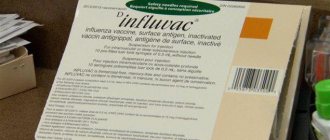Vaxigrip - flu shot
Inactivated (split) flu vaccine
Manufacturer: Sanofi-Pasteur, France.
Protects against viral diseases: influenza types A and B.
Used: for the prevention of influenza in adults and children from 6 months.
Not included in the national vaccination calendar.
Vaccination with the Vaxigrip vaccine is not carried out in clinics
Who needs a flu vaccination
First of all, flu vaccination is necessary for those who, due to their work, have to interact a lot with people: they are at greater risk of getting sick than others, especially for medical workers. The World Health Organization also recommends getting a flu vaccine for those for whom the flu poses the greatest danger - people predisposed to acute respiratory viral infections, the elderly, as well as those suffering from chronic diseases of the heart, lungs, kidneys, endocrine and nervous systems.
Indications for vaccination "Vaxigrip"
Vaccination is recommended for all individuals and, above all, for those who are at increased risk of contracting influenza, especially if influenza is added to existing diseases:
- Young children (under 1 year old)
- Children attending kindergarten, school, sports and children's sections, clubs.
- Adults over 65 years of age.
- People with chronic respiratory diseases, including bronchial asthma, renal failure, hemoglobinopathies and immunodeficiency conditions.
- Patients with cardiovascular diseases.
- Patients with chronic renal failure.
- Patients with chronic metabolic disorders, including diabetes mellitus.
- Children and adults with immunodeficiency conditions, patients receiving immunosuppressants, cytostatics, radiation therapy or high doses of corticosteroids.
- Children and adolescents from 6 months. under 18 years of age who have been receiving medications containing acetylsalicylic acid for a long time and are therefore at increased risk of developing Reye's syndrome due to influenza infection.
- Medical personnel, teachers, doctors, public transport drivers: all those who come into contact with large numbers of people every day, as well as members of their families.
The time has come for gray and dank autumn and the flu epidemic associated with this time of year. Do you need a flu shot? What advantages and disadvantages do our doctors note from vaccinations?
Let's be fair, the average person gets the basic information about flu vaccinations from unverified and, most often, implausible sources (from the words of friends, on forums, from people who are not very close to medicine, in fact, but “people who know for sure,” etc. .)
Disadvantages that await us when getting vaccinated against influenza:
- Vaccination does not provide absolute guarantees that the flu can be avoided, and flu shots are only valid for 1 year. Yes this is true. Even if you follow all the rules of vaccination (the responsibility of the medical staff and the quality of the biomaterial itself), it is not a fact that the flu will pass you by: the effectiveness of the flu vaccine is 75-90%. In addition, the influenza virus is constantly mutating. WHO predicts in advance the typical properties of influenza viruses and makes changes to the composition of vaccines, so vaccinations are supposed to be done every year.
- The flu vaccine is not suitable for everyone. If you are allergic to chicken protein or have allergic reactions to previously administered influenza vaccines, the flu vaccine is contraindicated for you. You should not rush to get vaccinated if you already have a cold; vaccination is carried out after recovery.
- The flu vaccine will not help if you have already been infected with the flu virus. Immunity to the virus is not developed immediately, but only 10-14 days after vaccination. In addition, according to some data, during an epidemic the virus literally hovers around us, and the concentration of the influenza pathogen in the air can add up to the pathogen in the vaccine if you have recently received one. As a result, you will become more severely ill.
- After a flu vaccination, complications arise in the form of bronchitis, tracheitis, sinusitis, pneumonia, and influenza-associated bronchial asthma. Children may develop specific inflammation of the cerebellum with subsequent loss of coordination of movements. The most severe complications of influenza are considered to be inflammation of the brain - meningitis and encephalitis. In older people, the infection can affect the heart, developing myocarditis (inflammation of the heart muscle itself) or pericarditis (a process in the heart sac).
However, let's talk about the advantages:
- The most obvious is specific immunity to the influenza virus, which is achieved through vaccination, and the body becomes protected not only from the disease itself, but also from its complications. The latter, by the way, are much more dangerous than the flu itself and can lead to death. Particularly vulnerable in this regard:
- children under 1 year old,
- bottle-fed children who have not received specific antibodies to influenza virus strains through breast milk,
- pregnant women, due to their position, are excluded from the protection system by their immunity against many infectious diseases,
- people with chronic diseases of the respiratory and cardiovascular systems, diabetes mellitus, autoimmune diseases, HIV-infected people with cancer,
- persons over 60 years old, because after this milestone, nature has programmed a decrease in the production of antibodies and various other protective factors against respiratory diseases,
- those who, by profession, have a lot of contact with people: health workers, teachers, social service workers, transport, trade, police, military personnel.
- Modern flu vaccines contain not one, but three pathogens - in order to prevent the disease in both the first and second waves of the epidemic. Today there is a choice between domestic drugs (“Sovigripp”, “Ultrix”) and imported ones (“Influvac” (Holland), “Vaxigripp” (France), “Begrivac” (Germany), “Fluarix” (Belgium), “Intanza” "(France). These medications are considered one of the best, since they do not contain a virus - they only contain proteins that cause an immune reaction.
- Let us note that among medical workers there is an opinion that it is pointless to get vaccinated against the flu, since the virus is constantly mutating and it is impossible to predict which strain will cause the epidemic this year. However, the official position is firm:
«Every year, the WHO does a huge amount of analytical work to select the strains that are most relevant for the coming season, and they are used by all the world's manufacturers of influenza vaccines for the upcoming influenza season. A vaccine that is relevant this season will not be used next year. ».
- Among healthy adults, the vaccine can prevent influenza by 70% to 90%. Among older people, the vaccine reduces severe illness and complications by 60% and deaths by 80%.”
- Selected statistics show that none of the children and adults who died from a laboratory-confirmed disease caused by the influenza virus were vaccinated against influenza.
Currently, the law in force in the Russian Federation is Informed voluntary consent to medical intervention and refusal of medical intervention , which states that health workers have the right to vaccinate children under 14 years of age only after the written consent of one of the child’s legal representatives. So, it’s up to you, dear parents, whether your child gets the flu or not! And he still can’t decide...
For those who are interested in this issue, the administration of the Trust Medical Center reports that vaccination against influenza is already being carried out at the clinic. Come yourself and bring your children, give them a chance not to get the flu!
Before vaccination, a doctor’s examination and temperature measurement are required, and after the vaccine is administered, the doctor observes the patient for 30 minutes. Before starting vaccination, a clinical blood test and a general urine test are required. In the absence of contraindications, vaccination is carried out.
VIEW PRICES √ WORK SCHEDULE
Make an appointment and get a consultation: +7;; +7 914-704-32-22.
Make an appointment online:
If you have any questions, ask them in the comment form below↓↓↓
Contraindications
Only a doctor can decide whether Vaxigrip is suitable for vaccination
Vaxigrip is contraindicated if you have a history of an allergic reaction to any component of the vaccine.
Vaxigrip vaccination is contraindicated in the following cases:
- If a child or adult is allergic (hypersensitivity) to the active substances of the vaccine or any of the ingredients - egg whites or chicken whites, neomycin, formaldehyde or octoxynol-9.
- If the child has an illness with high or moderate fever or acute infection.
Possible side effects
The following adverse reactions may be observed during vaccination: headache, sweating, myalgia, arthralgia, fever, malaise, chills, fatigue, dizziness, insomnia, vomiting, fever. Local reactions may include: redness, swelling, pain, induration, ecchymosis. Reactions usually resolve within 1-2 days and do not require treatment.
Come get vaccinated at MAMARADA. A full range of vaccines for children and adults, family vaccinations - at a special price!
Choice without choice
Almost the entire volume of both federal and city supplies in St. Petersburg last season was the domestic Sovigripp vaccine. The drug is produced by , which works within the structure of JSC National Immunobiological Rostec. Also, a subsidiary of Rostec is the Fort enterprise, which produces the drug Ultrix, which occupies 20% of the Russian market.
According to the National Immunobiology Company, the volume of influenza vaccines ordered in the country more than doubled from 2006 to 2017. In the current epidemiological season, 62.3 million doses of Sovigrippa and Ultrix were purchased for centralized supplies to the regions. According to the law, only domestic drugs are purchased for mass vaccination, which is carried out to patients at state expense.
According to the city health committee, in St. Petersburg in the 2018/19 season, the share of imported vaccines as part of universal vaccination was 1.32%. These are 1,760 doses of Vaxigrip vaccines purchased for people who suffer from chronic diseases and cannot take Sovigripp.
Vaxigrip is a product of the French company Sanofi Pasteur. According to the Health Committee, these purchases were carried out by district administrations.
Having been present on the Russian market for about 25 years, the French pharmaceutical manufacturer works mainly through pharmacy chains and distributors. The volume of supplies of the French vaccine to Russia has remained unchanged for several years: the company retains a market share of about 1–2%.
Also in Russia are influenza vaccines from NPO Petrovax Pharm, the Research Institute of Vaccines and Serums and the American company Abbott. In St. Petersburg, the Research Institute of Influenza and the Research Institute of Experimental Medicine are also working on the development of this group of drugs. The main difficulty is not even the cost of development, but the ability to find a suitable production site, because this is a necessary condition for conducting clinical trials.
The Research Institute of Vaccines and Serums brought its drug “Flu-M” to the market in 2018 and, as a result, has already won a 1% market share. Over the 11 months of 2021, the institute produced and sold 24,120 doses of its influenza vaccine for 5.98 million rubles.
As for release forms, vaccines are produced in three modifications - syringes, ampoules and vials. Moreover, if in 2017 the most popular form among consumers were syringes, then in 2018 the primacy passed to ampoules. The average price per dose in the 2018/19 season ranged from 162 rubles (Sovigripp) to 247 rubles (Vaxigrip). According to analytical estimates, the weighted average price per dose of influenza vaccine increased by 5% compared to 2017.










